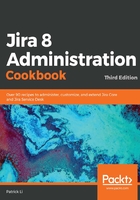
Conventions used
There are a number of text conventions used throughout this book.
CodeInText: Indicates code words in text, database table names, folder names, filenames, file extensions, pathnames, dummy URLs, user input, and Twitter handles. Here is an example: "This is the template file for emails sent in HTML format, which is stored in the html subdirectory."
A block of code is set as follows:
#disable_html_escaping() $eventTypeName - ($issue.key) $issue.summary
When we wish to draw your attention to a particular part of a code block, the relevant lines or items are set in bold:
<blockquote> <p>
#if($comment.body)
$comment.body
#else
<i>No comment</i>
Any command-line input or output is written as follows:
$ mkdir css
$ cd css
Bold: Indicates a new term, an important word, or words that you see on screen. For example, words in menus or dialog boxes appear in the text like this. Here is an example: "You can update this default scheme's notification settings by clicking on its Notifications link."